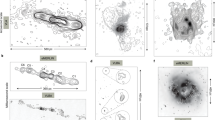Abstract
OBSERVATIONS of the distribution of the galactic radio emission at 4.7 Mc/s for southern declinations1 have shown evidence of pronounced absorption by interstellar ionized hydrogen within about 20° of the galactic disk. Between declinations −20° and −50° the disk is seen as a dark band approximately one-quarter as bright as the surroundings.
This is a preview of subscription content, access via your institution
Access options
Subscribe to this journal
Receive 51 print issues and online access
$199.00 per year
only $3.90 per issue
Buy this article
- Purchase on Springer Link
- Instant access to full article PDF
Prices may be subject to local taxes which are calculated during checkout
Similar content being viewed by others
References
Ellis, G. R. A., Green, R. J., and Hamilton, P. A., Austral. J. Phys., 16, 545 (1963).
Shain, C. A., Komesaroff, M. M., and Higgins, C., Austral. J. Phys., 14, 508 (1961).
Hoyle, F., and Ellis, G. R. A., Austral. J. Phys., 16, 1 (1963).
Shain, C. A., and Higgins, C. S., Austral. J. Phys., 7, 130 (1954).
Author information
Authors and Affiliations
Rights and permissions
About this article
Cite this article
ELLIS, G., HAMILTON, P. Absorption of Radio Waves in the Galaxy. Nature 204, 272–273 (1964). https://doi.org/10.1038/204272a0
Published:
Issue Date:
DOI: https://doi.org/10.1038/204272a0
This article is cited by
-
Nature of the Pulsating Radio Sources
Nature (1968)
Comments
By submitting a comment you agree to abide by our Terms and Community Guidelines. If you find something abusive or that does not comply with our terms or guidelines please flag it as inappropriate.



